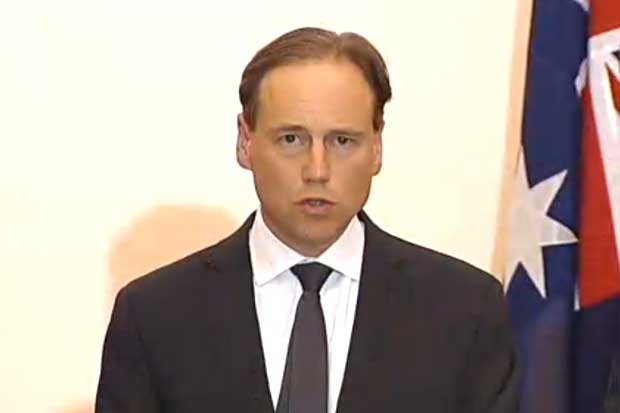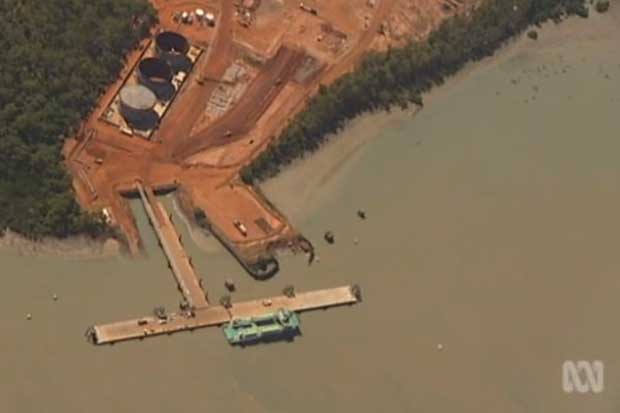Scandal is lapping the tropical shores of Tiwi Island, 80 kilometres north of Darwin, this week after the ABC revealed that a $130 million deep-sea port development has been built without any environmental approval.
The federal Environment Minister has announced an inquiry, the Northern Territory Environment Minister has denounced its “toothless” and “failing” environmental legislation, and the company responsible could face an injunction or $5.5 million fine.
The development, known as Port Melville, is intended for use as a supply base for offshore oil and gas rigs. It consists of a 36-hectare port, recognised legally last year by the federal government as ‘security-regulated’. The wharf leads into waters 12 metres deep and includes a 30 million litre tank for fuel storage and distribution.
The islands it’s built on, according to the Northern Territory government, are of “internationally significant” environmental value and authorities have identified “some 19 plant and 19 animal species found on the Tiwi Islands” as ‘threatened’ at the Northern Territory or national level.
Despite this, a Tiwi Land Council newsletter reveals Singaporean company Ezion finished construction on the port in October 2013 that despite it still not having been signed off by either the state or federal governments’ environment departments.
The bungle has prompted platitudes from the Territory government, but perhaps even more damning is the Commonwealth’s failure to assess the project under the EPBC (Environmental Protection Biodiversity Conservation) Act.
“The EPBC Act is triggered by projects likely to have a sign impact on a matter of national environmental significance,” said Northern Territory Environmental Defenders Office lawyer David Morris.
Matters of national environmental significance include threatened and migratory species. There’s plenty of those at the Tiwi Island site, and “it’s an offence to take an action likely a significantly impact matters of national environmental significance without EPBC Act approval”.
“A company proposing such an action has a duty under the act to refer it to the federal [Environment] Minister,” Morris said. Failing to comply with the Act can carry hefty penalties: “Fines of up to $5.5 million, for corporations, and there’s also potential liabilities for individuals involved in that process.”

On Monday, a spokesperson for the Department of the Environment told the ABC the project had not been referred for assessment by the company. On Tuesday, Environment Minister Greg Hunt reportedly said that the potentially illegal construction is being “investigated as a matter of priority”.
"The department is currently examining a range of information acquired in relation to the proposal to determine if a contravention of the EPBC Act has, or is likely to result from, the construction works to date,” a departmental spokesperson said.
A look through Hansard, though, reveals the government has been aware of the significant environmental impacts the project could have since, at the least, October last year.
At the time, Minister for Indigenous Affairs Nigel Scullion said: “The Department of the Environment is currently working with the proponent of the port development on Melville Island to determine whether the action requires assessment and approval under the EPBC Act.”
Greg Hunt’s office has not responded to or acknowledged multiple sets of questions from New Matilda.
“It appears,” as Tom Baxter, a corporate governance lecturer at the University of Tasmania who completed a PhD on the EPBC Act put it, “ there is some inconsistency in what the federal Environment Department has told the ABC and what’s revealed in Hansard records from October 2014”.
“Minister Hunt needs to urgently explain whether the EPBC Act has been complied with,” Dr Baxter said.
“Given the multiple threatened species in the area, why has this port's construction and operation not been subject to formal assessment under the EPBC Act?”
“The minister needs to explain urgently what steps have been taken to protect matters of national environmental significance, such as threatened species, so far and what he will now do to ensure they are protected into the future.”
Jacqui Taylor, a campaigner at the Australian Marine Conservation Society whose organisation has asked Hunt to seek an injunction immediately, also wants answers.
“The Northern Territory waters are some of the most pristine tropical waters anywhere on the planet,” she said.
“We have species that are found in the territory that are found nowhere else in the world.
“On the Tiwi Islands there appears to be a lot of internationally significant populations of birds and important nesting sites for marine turtles, as well as major aggregations of migratory birds and 38 species that are listed as threatened.”
Taylor, of course, is echoing the Territory government’s own advice. Yesterday, the Northern Territory Environment Minister, Gary Higgins, moved to play down the massive holes in Territory legislation through which Ezion's ships have sailed.
He argues that characterising the Melville Island port construction as a “fiasco” is unfair because no major environmental damage is yet known to have occurred.
“The legislation is there, it’s simply when people don’t abide by the legislation that we lack a bit of teeth in that area,” Higgins said.
“We ask people to give us notice of intent and we ask people to do an environmental impact statement.”
Teras Australia – the wholly owned subsidiary of Singaporean Ezion – did issue a notice of intent to the independent Environmental Protection Agency, which primarily handles assessment processes in the NT.
Unsatisfied with the document, the agency requested it be improved. Around two years later, it’s still waiting. No environmental impact statement has been completed and Higgins said the government lacks the legal power to compel Erizon to cough up.
He also conceded that, as Environment Minister, he hasn’t investigated the conservation value of the Tiwi Islands. He hasn’t contacted Teras Australia and because of a “loophole in the legislation, there’s no responsible minister for signing off on a port development”.

Higgins said a review of the relevant legislation is underway, and has been for six months, but refused to put a date on when that review would be completed or the legislation reformed.
“I don’t think there’s any way the government can stop development going ahead under current legislation,” he said.
If it finds a way to force its ‘One-Stop Shop’ policy through the senate, the federal government will soon be relying on the Territory’s legislation for top-level assessment and approval processes as part of a plan to pass off the majority of federal environmental powers to the states and territories.
The Northern Territory Environmental Defenders Office, which is under threat of closure after the Abbott government cut its funding, said the Territory government is clearly not ready for the responsibility of protecting those higher conservation environments and species.
“This case clearly shows what a disaster it would be if the Abbott Government was able to proceed with its plan,” said Greens Environment Spokesperson Larissa Waters.
It’s similarly clear that the attention now focused on the Tiwi Islands – where bids for a 120 port worker accommodation complex opened early last year – is also a disaster for Teras Australia.
The Singaporean parent company, Ezion, did not respond to requests for comment by the time of publication.
“It would seem unlikely,” Morris said, “that any responsible company would act in the manner that it has.
“It’s difficult to think of any explanation for not following the assessment process other than an attempt to shortcut or avoid completely the environmental assessment process.”
Donate To New Matilda
New Matilda is a small, independent media outlet. We survive through reader contributions, and never losing a lawsuit. If you got something from this article, giving something back helps us to continue speaking truth to power. Every little bit counts.



